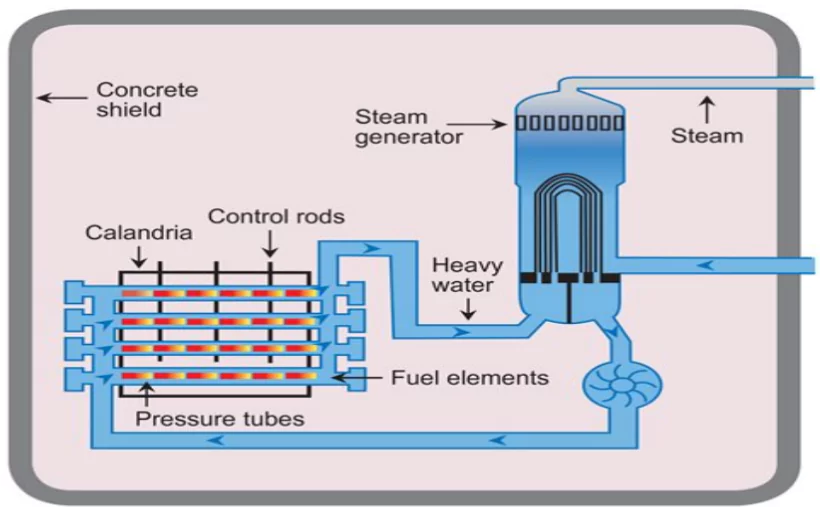India’s third home-built 700 MWe nuclear power reactor has achieved criticality and is expected to start commercial electricity generation soon.
Nuclear Power Corporation of India Limited (NPCIL)
- Mission: To generate safe, environmentally friendly, and economical nuclear power.
- Establishment: Founded in 1987 under the Companies Act of 1956.
- Currently operates 22 commercial nuclear power reactors, with 9 more under construction.
|
- Pressurised Heavy Water Reactor (PHWR):A pressurised heavy water reactor (PHWR) is a nuclear power reactor, commonly using unenriched natural uranium as its fuel, that uses heavy water (deuterium oxide D2O) as its coolant and moderator
- PHWR Development in India: India’s first PHWR was constructed in the late 1960s at the Rajasthan Atomic Power Station (RAPS-1), built through Indo-Canadian collaboration.

Enroll now for UPSC Online Course
Criticality of a Nuclear Reactor
- Criticality is the point where a nuclear reactor achieves a self-sustaining chain reaction, with nuclear fission occurring at a steady rate.
Types of Uranium fuel
- Natural uranium: Contains 99.27% uranium-238 (U-238) and 0.711% uranium-235 (U-235). It’s mined from the ground and can be used to fuel nuclear reactors.
- Enriched uranium: Contains more than 0.73% U-235, which is the energy source for reactors and weapons. There are different levels of enrichment:
- Low enriched uranium: Contains 0.711% to 20% U-235. It’s used in civilian reactors.
- Highly enriched uranium: Contains more than 20% U-235. It’s used in naval reactors and weapons production
|
- Significance: Achieving criticality marks the reactor’s readiness to generate power, as it indicates stable, controlled nuclear reactions. For India, this represents the progression of its nuclear energy capacity.
- The successful achievement of criticality of RAPP-7 is third after the smooth operation of Kakrapar Atomic Power Station(KAPS) Reactor 3 and 4, the first two 700 MWe PHWRs.
Significance of PHWR in India’s Energy Sector
- Energy Independence: PHWRs can use natural uranium, avoiding reliance on enriched uranium imports.
- Alternate Fuel Cycles: The technology allows the efficient use of alternate fuel cycles, making it versatile and sustainable for long-term energy generation.
- India’s first PHWR, RAPS-1, began the nation’s journey in nuclear power, which continues with advancements like the recent 700 MWe reactor.
Check Out UPSC CSE Books From PW Store
Other Types of Nuclear Reactors
- Light Water Reactors (LWR): Use ordinary water as both coolant and moderator, typically fueled by low-enriched uranium. LWRs come in two types:
- Pressurised Water Reactor (PWR): Water circulates in a closed loop and transfers heat to a steam generator.
- Boiling Water Reactor (BWR): Water boils in the reactor core, and the resulting steam directly drives turbines.
- Fast Breeder Reactor (FBR):
- Fuel: Mixed Oxide (MOX) fuel, made from plutonium and depleted uranium.
- Coolant: Liquid sodium, with no moderator.
- Example: The Prototype Fast Breeder Reactor (PFBR) at Kalpakkam is part of India’s second stage in its three-stage nuclear program.
![]() 21 Sep 2024
21 Sep 2024
